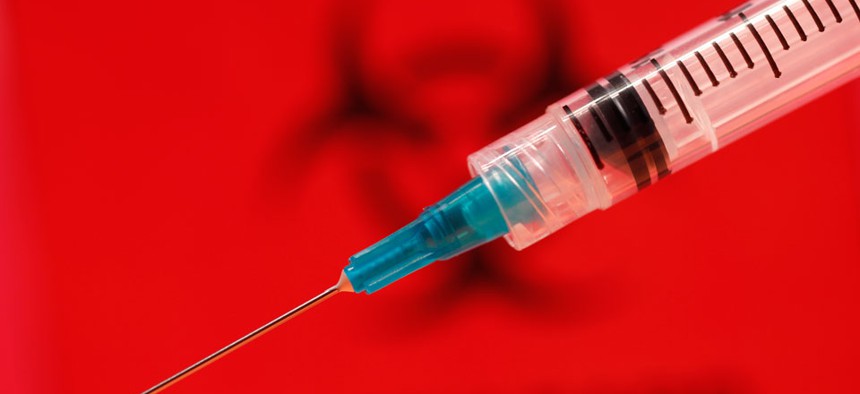
Centers for Disease Control and Prevention
Reopen the Government or a Pandemic Could Kill Us All
Like the military, the CDC protects us from outside threats. So why is it so severely furloughed?
When Republicans were talking about reopening the government piece by piece, certain very visible or emotionally charged programs rose to the top. Especially emotional was a discussion about reopening the national parks and memorials. Many conservatives, who came out in full force this last weekend, said that the metal barricades dishonored the dead. Similarly, the week before, there were cries to refund the National Institutes of Health to ensure that young cancer patients were put on experimental treatments.
What was left out of the discussions was the Centers for Disease Control and Prevention.
"To me, the CDC and infectious-disease monitoring is to the military what a hostile enemy threat is," Gregory Poland, an infectious-disease expert at the Mayo Clinic. "We don't furlough our military and say, 'Well, we won't just have any national security until the Congress gets its act together.' But why aren't we willing to save something that could cost just as many lives?"
When it comes to data, we already have a nationalized health care system. The CDC provides disease-tracking services that no other agency or private entity does. The CDC is the agency that makes the judgement call about what flu vaccines to distribute across the nation. Without the CDC, we have no real-time tracking of disease outbreaks. It monitors high-security labs that do tests on deadly pathogens like anthrax. It collaborates across international borders to stop outbreaks.
"That's what CDC does, and we have no other agency to do it," Poland says.
So while the closing of the WWII memorial offends, the closing of the CDC could kill.
Poland further explains the consequences, in this lightly edited interview.
How is the country's protection against disease outbreaks diminished during the shutdown?
The issue isn't really only for flu, but for a variety of infectious diseases, we don't have real-time surveillance. Hence, we lose a situational awareness, or intelligence about what's happening. Remember, CDC has [furloughed] 9,000 workers; they've got about 4,000 left. Imagine trying to do your job with two-thirds less resources.
They are responsible for putting together the information they get from individual states into a cohesive picture. We don't have that ability. They are responsible for monitoring what's happening internationally and what could be imported into the U.S. We don't have that capability. We can't follow flu outbreaks, we can't sequence viruses.
[The shutdown] really does put us at risk. In terms of influenza, it puts us at risk from several points of view. No. 1, we don't know what's happening nationally. All we can do is depend on what individual states report. Many of the state-level public health departments are underfunded and understaffed. We don't have the ability to sequence viruses and realize—whoops—suddenly a novel virus, like a new pandemic virus has popped up. We would have delayed-recognition of that. We might not have the ability to determine whether any of the viruses circulating are resistant to any of the antivirals we have. That information is important to get out to physicians, so they can treat—let's say you have a young child or a pregnant woman on a ventilator due to complications of influenza.
Are there no private agencies doing similar research as the CDC?
Let me try to give you an analogy. In terms of any, instead of infectious disease let's say a crime threat. You probably have a pretty good idea about what's happening in your neighborhood. You have no idea of what's happening a hundred miles away in the next-biggest city. And you don't have any idea what's happening in the state next to you.
The only way you would have that picture of what's happening, what the threat is, is because some entity responsible for piecing together all of those pieces would be doing their job. That's what CDC does, and we have no other agency to do it. We only have state public health labs. And they are simply not staffed and don't, especially the small ones, have the expertise to do this. They don't have any real way to share information across states. CDC is that coordinating body.
To me, the CDC and infectious-disease monitoring is to the military what a hostile enemy threat is. We don't furlough our military and say, "Well, we won't just have any national security until the Congress gets its act together.' But why aren't we willing to save something that could cost just as many lives? Why are we willing to do that for infectious disease threats?
How does the shutdown impact your operations at the Mayo Clinic?
It probably has the same impact for us as it does any medical center, and that is, we're not going to be getting national intelligence about what's going on. We'll know what's going on in our area. But we serve a national and international population and we won't have up to the minute data.
We're talking in dramatic terms. Is any of this overstated?
Let me take you back to February 2009. Out of nowhere, a few unusual respiratory illnesses in a rural part of Mexico, and then a few of those cases in Texas, and then a bunch of those cases in the Northeast states. Within a couple of weeks, CDC investigates, sequences the viruses and pushes the button. "Nation: We've got a novel pandemic virus." What would happen if that happened now? There would be delayed recognition, thousands more would get ill, would die. we would be flying blind. It would be delayed development of a vaccine to cover it, we wouldn't know what antivirals to use.
The other thing could happen too. The season just kind of pedals along—no new viruses no surprises, no new viruses or infectious disease threats anywhere in the world. And the shutdown resolves and we're a little behind on next year's vaccines. We're somewhere in that spectrum.







